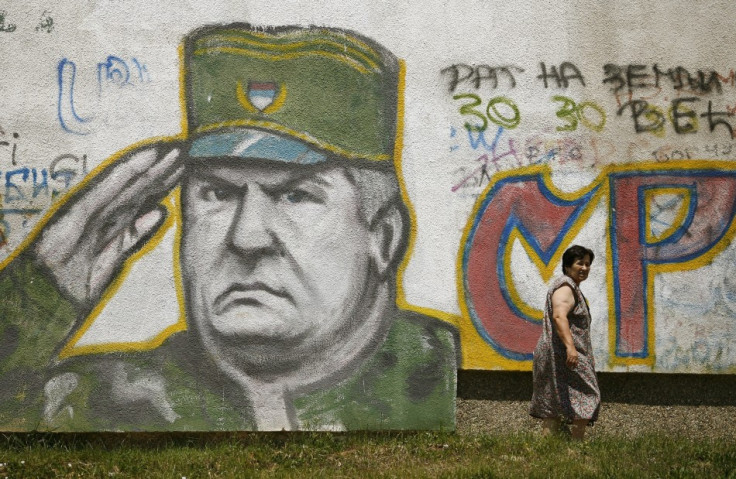Ratko Mladic's arrest confirmed

Bosnian war crimes suspect Ratko Mladic has finally been arrested after being on the run for more than fifteen years.
Serbian broadcaster B92 was the first to report the arrest and said the suspect had been using the name Milorad Komadic, while earlier on an interior ministry official confirmed to Reuters that a suspect was being held.Talking about the man in custody he said:
"He has some physical features of Mladic, we are analysing his DNA now," the official said on condition of anonymity, before adding that the man was arrested in Serbia on an anonymous tip-off
However the UN International Criminal Tribunal for the former Yugoslavia recently released a statement confirming the arrest adding that the Prosecutor for the tribunal welcomes the arrest of Madlic.
"I welcome the arrest of Ratko Mladić today in Serbia. We await arrangements for his transfer to The Hague where he will stand trial before the International Criminal Tribunal for the Former Yugoslavia.
"We recognize the work done by the Serbian authorities, specifically the National Security Council and Serbia's Action Team, in apprehending Ratko Mladić..."
Serbian President Boris Tadic is due to make a statement shortly.
Mladic was Bosnian Serb leader Radovan Karadzic's army chief throughout the Bosnian war. He is indicated for war crimes committed during the Srebrenica massacre of 1995 where 8,000 Bosniaks were killed..
As Mladic has been a fugitive since 2001, when he was first indicted, the failure of Serbian authorities to locate him often made the headlines throughout the years and was perceived as an embarrassment by the UN tribunal.
The arrest came as according to a poll published by Racim Ljajic, the Serbian minister for Labour and Social Policy on May 15, more than 40 per cent of Serbians still see him as a war hero, 51 per cent of the population is against his hand over, while 78 per cent would not give any information about him and claim the more than fourteen million dollar reward for his capture.
In 2008, the chief prosecutor of the United Nations tribunal for Former Yugoslavia, Serge Brammertz, told the European Parliament that Mladic was thought to be hiding in Serbia.
"On the basis of the information we have received from Serbia, we have no reason to believe they are not in Serbia,'
Recently, during a visit to Belgrade on May 10 and 11 the prosecutor reiterated that the main working hypothesis was that Mladic was hiding in Serbia, which has been accused of protecting him for years.
After the US killed Osama Bin Laden in May, Dunsan Mladic, the head of Serbian government's office for cooperation with the International Criminal Tribunal for the former Yugoslavia (ICTY) publicly ridiculed Serbia by saying "If still alive, former Bosnian Serb military leader Ratko Mladic is apparently hiding better than Osama bin Laden"
Brammertz's assessment is not something new, as despite being officially willing to cooperate Serbia was widely criticised for not doing enough to arrest the genocidal war leader.
The arrest of Mladic came as prosecutor Brammertz was due to hand in a report to the UN Security Council in June on the level of Serbia's cooperation and efforts to find the war criminal.
The assessment was considered as highly important for Serbian authorities as the arrest of Mladic is a key pre-condition for the country's entry into the European Union. Serbia has been hoping to get an EU candidate status for quite a while and without the arrest of its most wanted fugitive that goal was seeming increasingly unlikely.
Until now, The Netherlands, which advocates firmly for conditioning Belgrade's EU integration process with the cooperation with the Hague tribunal, was not convinced that the authorities were doing their best to meet their obligations to the court. A delegation of the Dutch parliamentary committee on EU integration visited Serbia earlier this month to see how the reforms were going. According to the Danas daily the parliamentarians had concluded that it was too optimistic to believe that Serbia's goals, related to the EU membership, could be met by the year-end.
EU foreign ministers had also stressed that any progress of Belgrade towards EU membership will depend on the cooperation with the ICTY and soon after the arrest the European commission declared: "We consider that Serbia has understood the importance of reconciliation with its history and its people and has decided it concretely wants to move further on its European path."
The arrest is certainly bad news for, the family of Ratko Mladic, as on May 23 they went to court to demand the return of nearly €15,000 confiscated in a police raid last year.
Their lawyer Milos Saljic said at a hearing Monday that the money was taken illegally from Mladic's wife Bosiljka and son Darko during the search of the family house in Belgrade last February.
The authorities counter-argued that the money was taken so it would not be used to finance Mladic's hiding.
It then seems that after all, after ten years of intense diplomatic pressure the Serbian authorities have finally managed to capture Mladic and it all came coincidently as their access to Europe membership was slipping away from their grasp. Whether the arrest will be followed by an investigation in the regime's involvement in protecting the criminal for many years is yet to be known.
© Copyright IBTimes 2025. All rights reserved.





















